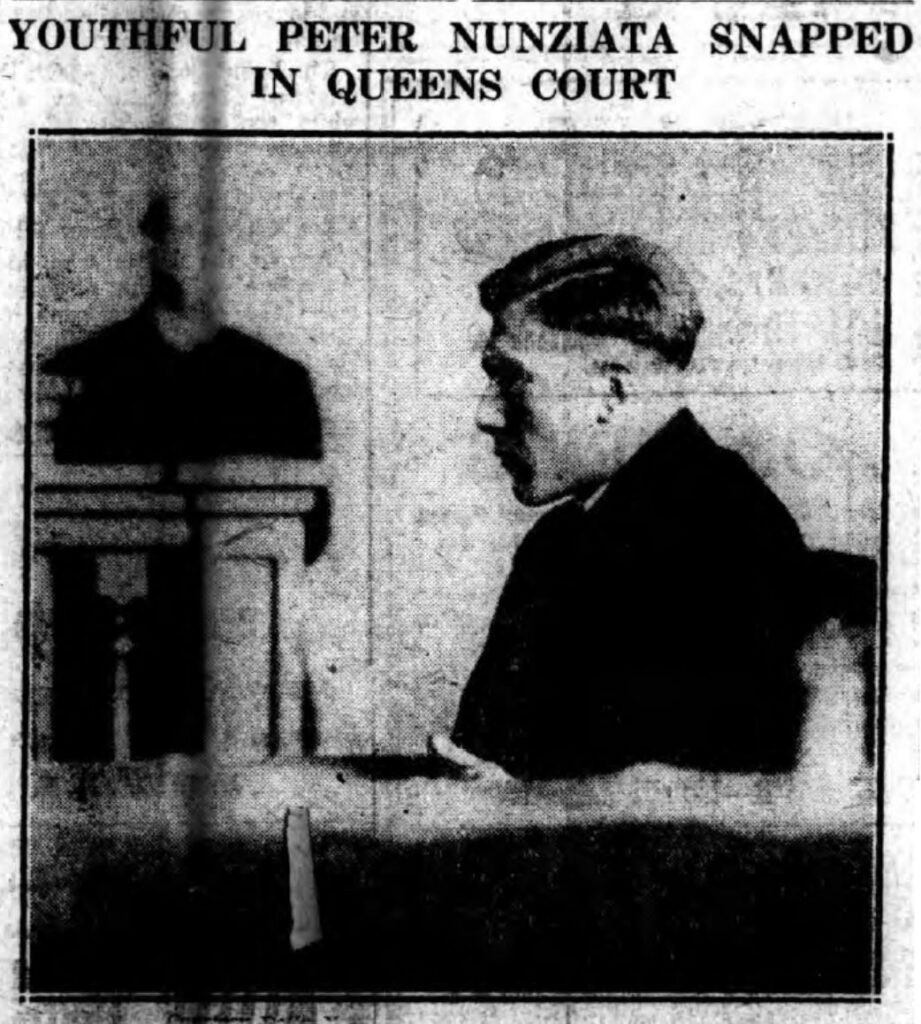By Ed Wendell
Last week, we brought you the story of the murder of Professor Wilfred Phineas Kotkov of Woodhaven. It was a frigid night in February 1921 and the professor was attacked and brutally beaten with an iron bedpost in an empty lot on Liberty Avenue. Kotkov succumbed to his injuries, leaving a young wife and two children behind.
Two young men were identified at the scene and once at the station, they confessed and gave up their friends. There were immediate calls for swift justice; newspaper editorials called for the ultimate retribution – the electric chair.

Peter Nunziata was the youngest person ever sentenced to death in the State of New York, paying the ultimate price for his part in the murder of Professor Wilfred Phineas Kotkov of Woodhaven.
Within a week, indictments were handed down and the trial of 17-year-old Peter Nunziata began just 5 weeks after the attack. Nunziata, the youngest of the four attackers, denied any role in the attack and claimed that his confession was beaten out of him by police.
The jury deliberated for less than two hours and found Nunziata guilty, and the judge set the date of execution as June 5th. Peter Nunziata was the youngest person ever sentenced to death in the State of New York.
The second young man to go on trial was Joseph Alfano of Brooklyn. He shared the same lawyer as Nunziata and his defense was basically the same, stating that he was beaten badly by police and that the confession was handed to him with the order to sign it – or else!
The trial lasted 2 days and Alfano was found guilty. Days later, Alfano wept like a child as he was sentenced to death and transported to Sing Sing, his execution scheduled for just a few weeks after Nunziata.
The remaining two men awaiting trial – Frank Cassesso, and Alphonso “The Turk ” Verona, no doubt swayed by the results of the first two trials, rushed to plead guilty.
Nunziata and Alfano’s lawyer immediately appealed their death sentences, based on their sanity and their age, and these efforts were immediately denied. Finally, on June 6th 1922 (Nunziata’s nineteenth birthday) he was told that he was out of appeals and would die in just over a month.
With hours to go, Nunziata’s last chance evaporated when Governor Nathan Miller of New York refused to grant him clemency.
“Am I to stop the execution of the law because the defendant was slightly under 18 when the crime was committed? If so, where shall the line be drawn? A few weeks over or a few weeks under 18 can make little difference on the question of responsibility,” he said.
“This was a calculated, deliberate, brutal murder for a sordid purpose.”
The night of his execution, Nunziata was visited in the death house by his parents and other members of the family, who came from their home in Williamsburg. None of his family was permitted to embrace him or touch him in any way, a heavy mesh screen keeping them a foot away from his cell door.
His family had brought a bounty of food, but Nunziata was not allowed to have any. Instead, he requested that it be divided among the twenty-nine other condemned men occupying nearby cells.
When it came time to take the final, fateful walk to Old Sparky, Nunziata’s family members were consumed with grief as they said goodbye. Nunziata had remained calm throughout the visit, but seeing his parents in tears shattered his resolve.
But he gathered his composure and comforted members of his family by telling them that he was glad his troubles would soon be over.
“I am ready,” he said, and turned his back on his family, and walked past the cell doors of other men who were also soon scheduled to die. Ten minutes later, Peter Nunziata, nineteen years old, was pronounced dead.
It would be a year later that Alfano would take a similar trek to the electric chair, paying the ultimate price for his part in the murder of Professor Wilfred Phineas Kotkov of Woodhaven.
Of the remaining two men arrested for the crime, little is known. Cassesso served his time and, upon release, disappeared. And Alphonso “The Turk” Verona of Woodhaven, believed by many to be the devious mind behind the brutal crime, was eventually released from prison in his 50s and took up residence in Richmond Hill, where he lived ten quiet years until passing away at age 62.
This fateful night over 100 years ago is a tragic tale that ruined the lives of Kotkov’s wife and children, while also ruining the lives of the families of the young men executed for their brutal act of violence, a terrible tragedy all around.


